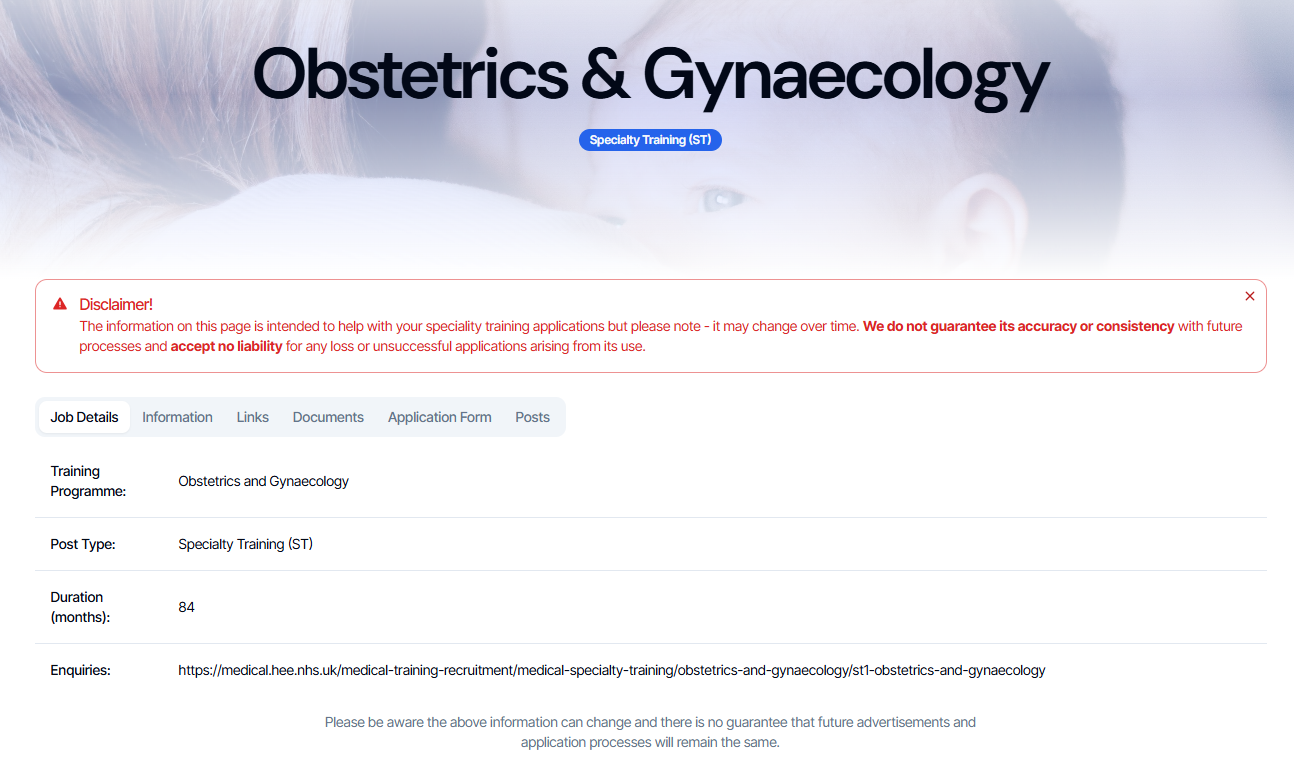Speciality Training in OBGYN (O&G) in the UK

Obstetrics and Gynaecology (OBGYN) is a branch of medical sciences which is a mix of both medical and surgical care. Training in OBGYN in the UK is highly sought after and competitive.
Related subspecialties
Obstetrics and gynaecology (obgyn) is a run-through training program in the UK, where there is no separation between core and speciality training. It’s 7 years long, and you need to pass MRCOG part 1 between ST2 and ST3 years and MRCOG part 2 and 3 between ST5 and ST6.
Please go through Speciality (or GP) training in the UK for more information regarding how the training is structured.
The following subspecialties can also be pursued during or after training:
- Gynaecological oncology
- Maternal and fetal medicine
- Reproductive medicine
- Urogynaecology
The structure of OBGYN Training
As mentioned earlier, OBGYN is a run-through speciality training in the UK, so the core and speciality training modules are not separate. The following discussion about the training structure assumes that you already have obtained GMC registration and working in the NHS in a non-training job.
- Foundation training
- Run-through training
Foundation training
If you are a non-UK/EEA medical graduate, then you have three options:
- Obtain the equivalent of foundation training outside the UK
- Obtain the equivalent of foundation training inside the UK
- Getting into the foundation training by UKFPO.
You can get the certificate of readiness to enter speciality training (CREST) form signed by your overseas consultant if you had worked under them for at least three months after completion of your formal internship/house job.
The same way, you can start working in the UK as a non-training doctor and after working under a consultant for at least three months, you can get those competencies signed off.
More information regarding Internship and UKFPO can be found here.
Getting into UKFPO’s two-year foundation training is not applicable for those who have finished formal internship/house job following their graduation. If you hadn’t done your formal internship/house job after graduation for any reason (like taking USMLE, etc), you should do it before you think about moving to the UK. The reason for this is that until or unless you have a right to work i.e. having UK nationality or having spouse visa (NOT dependent visa), it is very difficult to get a post in the foundation training by UKFPO. You will have to take PLAB both ways (UKFPO or home country’s internship), as you did not graduate from the UK/EEA.
Run-through Training
Getting into ST1 OBGYN Training
Before applying, you should ensure that you meet the relevant eligibility requirements.
- Foundation competencies i.e. CREST signed, which has already been discussed above.
- Having 24 months’ or less experience in Obstetrics and Gynaecology (not including Foundation modules) by the time of the intended start date.
Then, when the application rounds open, the application is made via the ORIEL system and longlisting happens. Unlike Internal medicine training, for the recruitment of ST1 OBGYN, you need to go through an exam – Multi-specialty Recruitment Assessment before you are called for an interview.
Getting into ST3 OBGYN Training
Even if the OBGYN training is a run through training, there is provision for getting into ST3 level as well. The vacancies are LESS as compared to ST1 vacancies, so the competition is steep as well.
Your core ST1/ST2 competencies need to be signed. You also need to have completed MRCOG part 1 at the time of application. You can not have more than 60 months of OBGYN experience. This training post is a direct road towards consultancy.
Sub-specialty Training
This is further training, which can be pursued as an out-of-program or even after having the completion of training.
Subspecialty training programs are advertised in the BMJ. If you wish to register for subspecialty training, you’ll need to apply directly to the Deaneries/Trusts as set out in the adverts. The following are available:
- Gynaecological oncology
- Maternal and fetal medicine
- Reproductive medicine
- Urogynaecology
What an IMG (non-UK, non-EEA, without a settled visa) can do to join the OBGYN training in the UK?
I assume that you know that the first target is always to get GMC registration. After getting GMC registration, the initial approach should be to acclimatize yourself with the NHS by way of doing non-training jobs.
Gaining competencies and enriching portfolio in a Non-training job
Competencies are a set of knowledge, skills and abilities, and other requirements that are expected from someone to perform a job. All the training levels have their specific list of competencies to achieve in the end. There are ways to gain those competencies even without being in a formal training program. You would have to take control of your own training.
1. Evidence of Foundation Competence
One of the primary things that needs completing is the ‘Certificate of Readiness to Enter Specialty Training‘ or the CREST form. This form has been updated and modified, so please make sure that you are using the 2024 version of the CREST form otherwise it WILL NOT be accepted.
The following individuals can sign your competency form:
- Consultants
- GPs
- Clinical Directors
- Medical Superintendents
- Academic Professors
- Locum Consultants with CCT/CESR
The person who signs it must have worked with you for a consecutive 3 months within the last 3.5 years from the start date of the post in question. They do not have to personally witness your completing all of the professional capabilities listed; if there is sufficient alternative evidence at hand that you have demonstrated these capabilities, they can sign you off. Please note that clinical attachments/unpaid rotations WILL NOT count towards the 3 month requirement.
If the individual signing your competencies is registered overseas, it is your responsibility to provide the necessary evidence proving their registration. You must attach proof of their registration along with your CREST form and translate any part of the document as needed. If they have had GMC registration but no longer hold it, it will not be considered.
2. Evidence of Core Competence
You can continue working at the non-training SHO level and find your way to maintain an RCOG e-portfolio and eventually get your ST1/ST2 Competencies signed by your supervising consultant. This involves clear communication with your supervising consultant(s) and making them aware of your intentions of getting the competencies signed.

3. Passing MRCOG exams and boosting your portfolio
Getting your membership exam done as soon as possible is something you should know already. Other than that, there are many things that influence your specialty training application. As the interviews are very competitive, and that’s why emphasis needs to be given on your portfolio.
- Postgraduate degrees and qualifications and additional degrees
- CPD courses
- Additional Achievements
- Quality Improvement (clinical audit)
- Teaching experience
- Training in teaching
- Presentations
- Publications
- Leadership and management
- Commitment to surgery
- Clinical/procedural experience in both surgical and non-surgical posts
- Organization of your portfolio
Listen to Mr Tim Hookway, Consultant Obstetrician and Gynaecologist
Frequently asked questions
I have completed MRCOG all parts, where do I start?
With a completed MRCOG you can get GMC registration as a medical practitioner and work as a doctor in the UK. But to be a specialist/consultant, you need to go through some sort of training in the UK (CESR-CP) or prove to GMC that your training back home was equivalent to GMC-approved training (CESR).
Can I do MTI for OBGYN?
Certainly, you can. MTI post will grant you GMC registration, and it will help you further your career both home and in the UK. Read more about Medical Training Initiative (MTI).
In the end, I don’t want to inflate anyone’s expectations nor do I want to sound pessimistic. The OBGYN training in the UK is not impossible if you work towards it.

